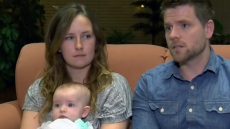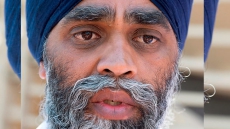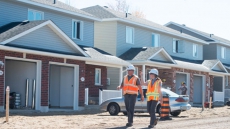WINNIPEG — Bundled against bone-chilling cold, asylum-seekers hoping to gain refugee status in Canada have been trudging through ditches and fields along the border with the United States.
Many have already had refugee or asylum claims turned down in the U.S. and feel they may have more success in Canada. That assumption, say some immigration lawyers, is correct.
"I think that there is a lack of access to justice (for claimants in the United States)," said Bashir Khan, an immigration lawyer in Winnipeg.
"In most of Canada, you do get ... a legal-aid assigned lawyer. You're not put in immigration detention, so you are able to make long-distance calls to gather evidence that your lawyer may tell you is needed."
Alastair Clarke, another immigration lawyer in the city, said he has represented people who have been rejected in the United States but are accepted in Canada.
"It happens regularly," he said.
"In the United States, there's a much higher rate of detention ... and when the individual is detained, it's much more difficult for them to access counsel. They have limited rights to legal counsel for legal advice, and the counsel who do represent them are often lawyers who don't specialize in (immigration)."

Statistics provided by the Immigration and Refugee Board show refugee claims from people fleeing some countries are approved more often than not. The statistics include all claims, not just those from people entering via the U.S.
The numbers are only for people who make their refugee claim at official border crossings or within Canada after getting across the border — not people who apply from abroad. And they only cover claims that have already been screened for eligibility by the Canada Border Services Agency or Immigration, Refugees and Citizenship Canada.
In the first nine months of 2016, 54 per cent of claims from people who cited persecution in Ghana were approved. Two-thirds of Somalia-related claims were OKed and the success rate for people fleeing Djibouti was more than 90 per cent.
Some claimants arrive in Canada after making a trip across three continents along what has become a modern underground railroad.
Mohammed, a refugee claimant from Ghana who did not want his last name used, walked across the border near Emerson-Franklin in Manitoba last fall after flying from Africa to Brazil and on to Ecuador. He then spent three months making his way north on buses, a boat and on foot, he said, until he entered the United States near San Diego. He planned on making a new home in the U.S.
At the California border, he was put in a detention centre for 10 months and his claim was rejected, he said. He could not get a lawyer and was unprepared for the hearing, he added.
"You don't have any access to anything ... you cannot make a call to get whatever you have to to support your case.
"You're going to sit there. You, alone, meet a judge and a government lawyer who's a prosecutor."

In Canada, claimants are generally released pending their hearings and are supported by non-profit groups. Most provinces offer legal-aid for refugee claims.
Under U.S. law, asylum-seekers who have their claims rejected must be released from detention within six months. After that, they are subject to strict reporting conditions, knowing that one day they will be deported.
"They are eventually told, 'Your deportation is going to happen pretty soon, so make sure you're ready for it'," Khan said.
"When they sort of get that hint or a tip-off from immigration officials themselves, that's when they try to figure out how they can enter Canada and whether they could ... get a more fair process than the one they've gone through."





